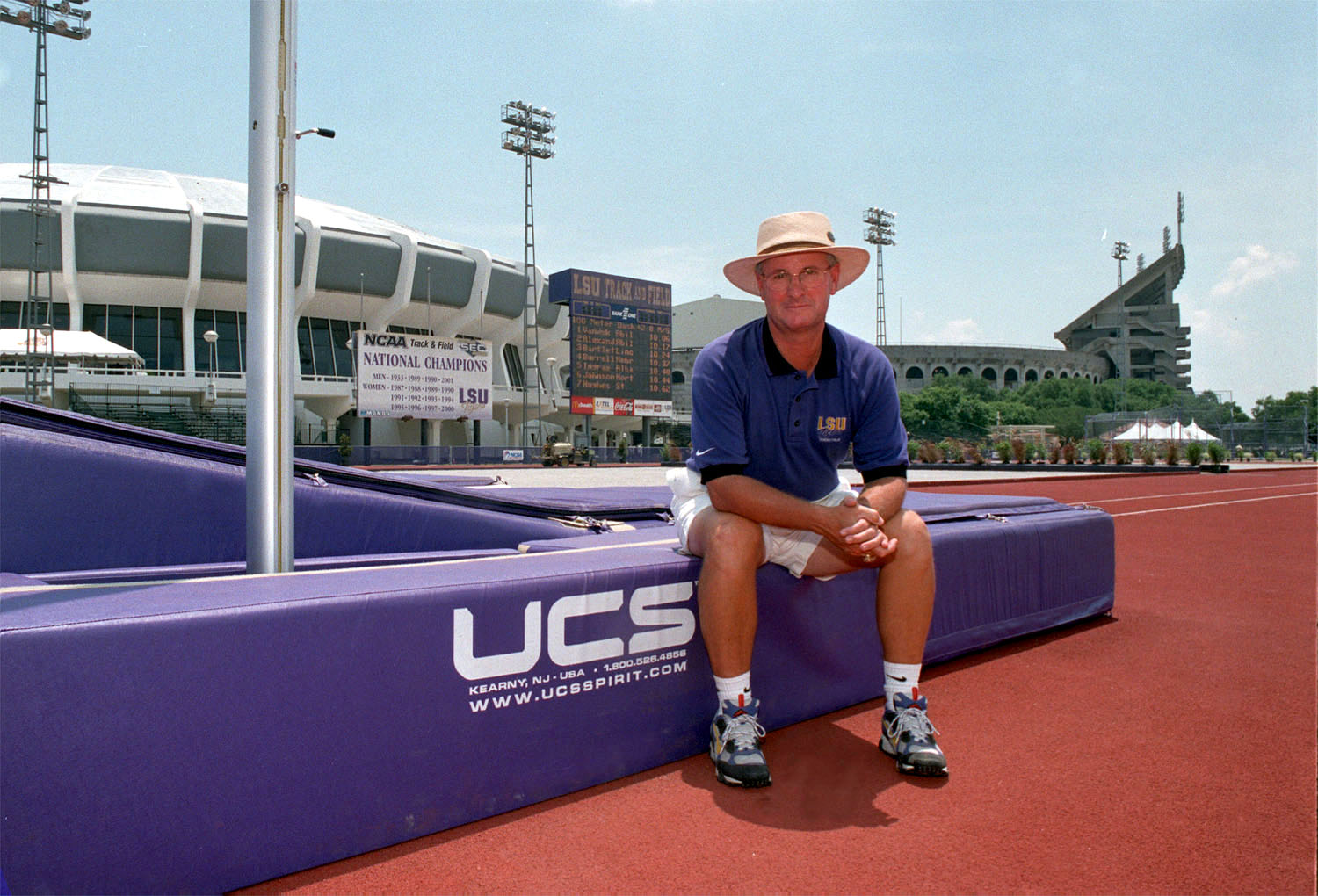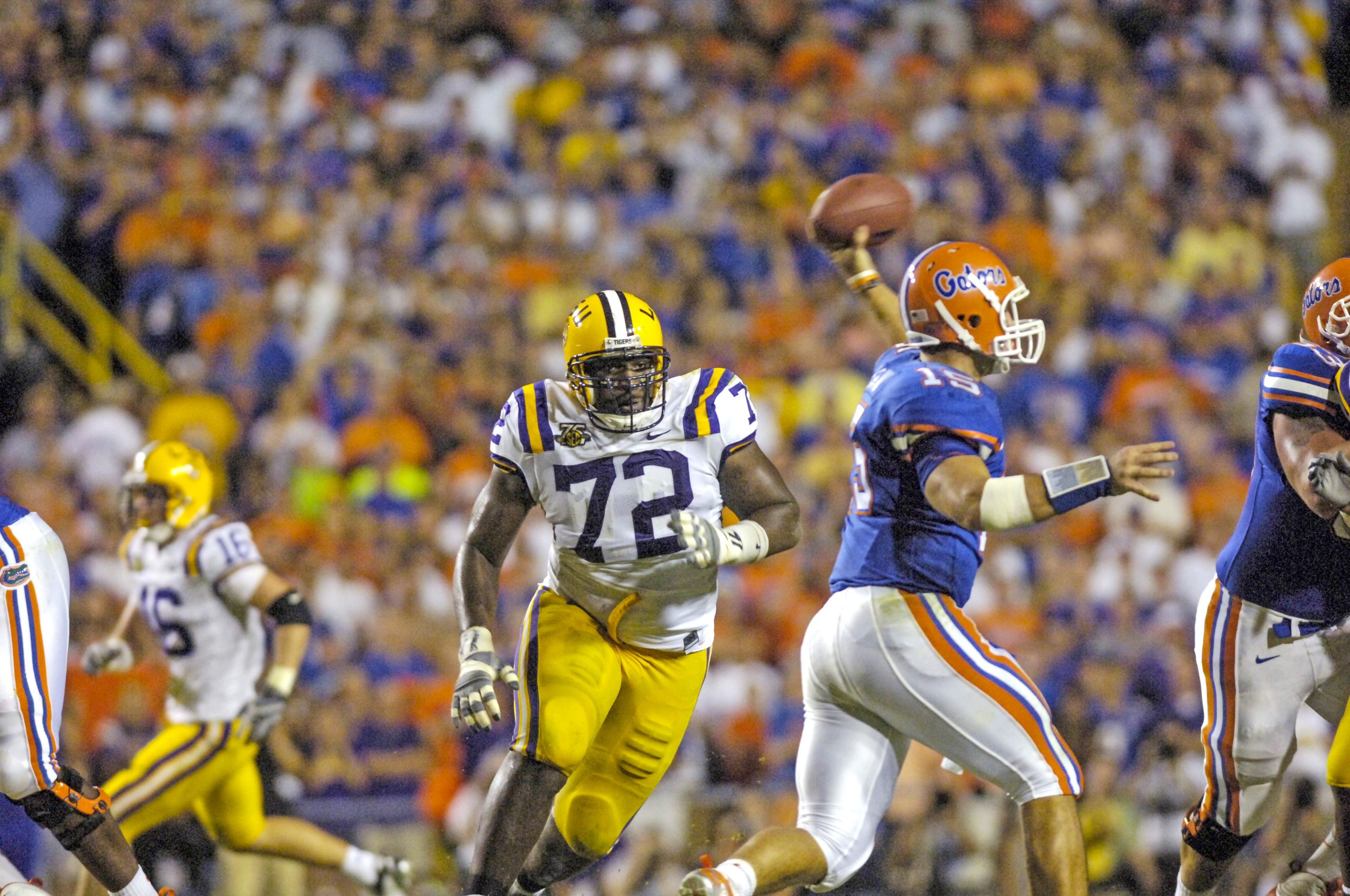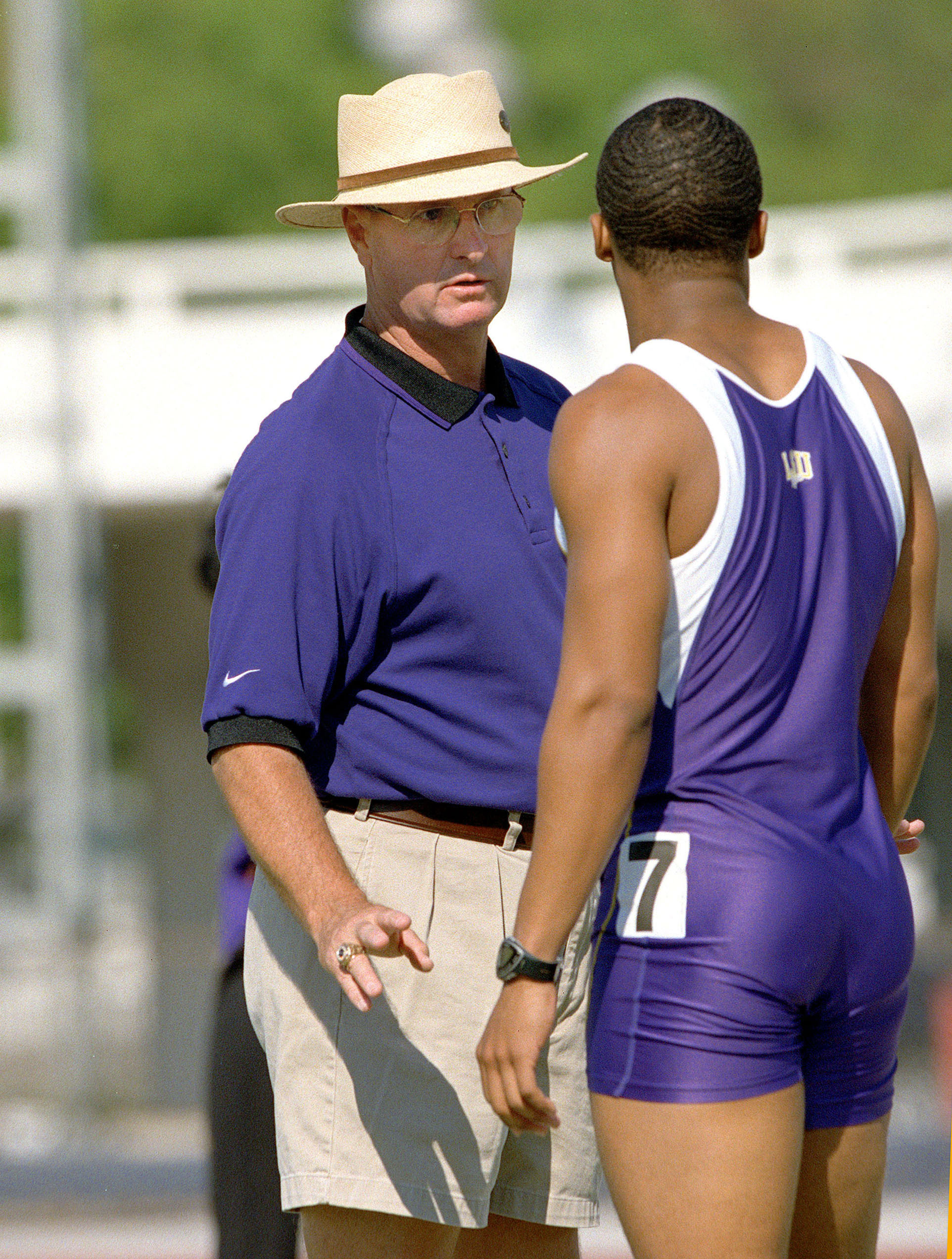
By SHELDON MICKLES
Written for the Louisiana Sports Writers Association
Growing up in the 1950s and early 1960s in Albuquerque, New Mexico, Pat Henry and his four younger brothers had no trouble deciding what career path they would take.
In their minds, there was absolutely nothing wrong with wanting to be a doctor, lawyer, banker or police officer. It’s just that getting into the Henry family business was at the very top of their list.
There was no question, not even at such a tender age, that they would follow in the footsteps of their late grandfather and father once they graduated from college.
So, coaching it was. Granddad Gwinn Henry, the head football coach and track and field coach at the universities of Kansas, Missouri and New Mexico in the 1920s and 1930s, made it his life’s work.
Gwinn Jr., better known as “Bub,” took the torch from his father and became a high school track coach before joining legendary New Mexico coach Hugh Hackett’s staff in 1961.
Growing up in that environment, all that remained was for Bub Henry’s five sons — Pat, twins Mark and Matt, Timmy and Roben — to catch the coaching bug as well.
“We didn’t have a choice,” Pat Henry said with a chuckle. “I’m just glad my dad and grandfather weren’t bricklayers. We would have a bricklaying company and we’d all be doing that right now.”
Perhaps. But if there was a bricklaying hall of fame, Henry, who’s become one of the most successful coaches in collegiate track and field history in 34 combined seasons at LSU and Texas A&M, would probably be in it.
Henry and his entire family, including mom Dona, were inducted into the New Mexico Sports Hall of Fame in 1998.
Henry has also been enshrined in the U.S. Track & Field and Cross Country Coaches Association (2002) and Texas Sports (2017) halls.
Another honor comes Aug. 28 when the scholarly-looking 70-year-old Henry takes his place in the Louisiana Sports Hall of Fame in Natchitoches after guiding his teams to a stunning total of 36 NCAA men’s and women’s indoor and outdoor titles — 27 of them during a 17-year stay at LSU from 1988 to 2004.
His 36 national titles rank third all-time behind Kenyon College’s Jim Steen, who won 50 Division III swimming and diving titles, and Arkansas’ John McDonnell, who piled up 40 Division I men’s titles in cross country and indoor/outdoor track.
Henry’s latest honor comes more than six decades after deciding he would follow the career path of his grandfather and father.
“The environment around my home was coaching,” he said. “From the time I was a real young kid, I’m thinking that I’m going to be a coach.”
It all started, brother Matt Henry said, around the dinner table.
Back then, families gathered each night to share a meal and discuss what happened at school or anything else that was on their minds.
“We would always have dinner together, that was important in our family, and we had these discussions,” Matt Henry said. “Since grandpa was a coach and dad was a coach, we talked about athletics a lot.
“It was probably ingrained in Pat’s mind that it was what he wanted to do. Coaching pretty much came natural to all of us the way we grew up.”
Matt and Mark went on to become co-coaches of the New Mexico track program, Timmy was a middle-school teacher and coach, and Roben oversaw the pools for the parks and recreation department in their hometown of Albuquerque.
“They’re all retired now,” Pat Henry joked. “That doesn’t make sense, does it?”
Yet, it’s not the end of the Henry coaching line.
Matt’s sons, Kurt and Kenny, represent the fourth generation of Henrys in the profession; Kurt is an assistant track coach at New Mexico and Kenny, who was a distance runner for Uncle Pat at LSU, is a successful high school track coach in New Mexico.
Many years earlier, Bub Henry set the stage for his five sons — and now, two of his grandsons — to follow his lead.
“Patrick and all of my boys helped when I ran the AAU national meets in Albuquerque,” he said in a 2002 interview. “I put them to work when they were little-bitty kids. They would hold the string at the finish line and do all kinds of things. They were around, so they couldn’t help but be involved.”
“It started with our grandfather, but our dad also knew the importance of athletics,” Matt Henry said. “He passed that on to us, so we were blessed that way.”
The Henry family’s track heritage actually traces back more than a century to 1911, when Gwinn Sr. was proclaimed the “Fastest Man in the World” by New York newspapers.
Pat Henry acknowledged long ago that his early exposure to the sport at his father’s side undoubtedly helped him get to where he is today.
“I’ve always felt comfortable being in that setting, talking with athletes and being around nathletes; that’s a big part of it,” he said. “Some people are intimidated in those types of environments, but I grew up around it and was never intimidated by it.
“If you could communicate with the athletes and you knew what you were doing, you could be successful with it.”
Successful is a word that has become synonymous with Henry since he began working with high school athletes while still a student at New Mexico in 1972.
About that time, he met Gail Duggin, who eventually became his wife. The couple, who have two children and four grandchildren, celebrated their 47th anniversary in June.
“On our first date, we went to a New Mexico basketball game and then went to get some hot chocolate,” Gail Henry said. “He was sitting across the table from me and I asked him what he wanted to be when he grew up.
“He said, ‘I’m going to be the head track and field coach at a major university one day,’ ” she said. “It came out so strong that I never even questioned him. He said he knew that from the time he was 7 years old.”
While her husband doesn’t remember putting an exact year to it, he’s seen his lifelong dream fulfilled — both of becoming a coach and heading up the track and field program at a major university.
“Gail always told me that if I had found something different it really wouldn’t be any different because I would always be trying to be the best at it,” Henry said.
Current LSU coach Dennis Shaver, who has won three national titles since succeeding Henry after the 2004 season, saw that after joining Henry’s staff in 1995.
‘“It doesn’t matter if he was a coach or an athletic director … or whatever it was going to be,” Shaver said. “There’s no doubt he would be very successful in whatever endeavor he would be involved in.”
Bricklaying jokes aside, it was always coaching for Henry.
After starting out as an assistant, he quickly became a successful head coach when he won four state titles at Hobbs High School in New Mexico and a pair of national titles at Blinn (Texas) Junior College — all by the time he was 35.
Hired in June 1987 by then-LSU athletic director Joe Dean, Henry enjoyed unparalleled and immediate success beginning the next spring.
The Lady Tigers won the NCAA outdoor title for the second year in a row, then claimed the next nine to make it 11 consecutive national outdoor titles — an NCAA Division I record that still stands. They also won 10 indoor championships in that stretch.
When his 1989 LSU men’s team claimed the NCAA title, the first for the school in 56 years, the Lady Tigers also won. It was the first time a school swept the outdoor titles in the same year, a feat LSU repeated a year later.
Recognized as one of the nation’s top sprints and relays coaches, Henry had 37 Olympians who won three gold medals and 38 World Championships participants who brought home six golds during his tenure at LSU.
Henry was also head coach of the U.S. men’s team that won 10 golds and 19 total medals at the 2007 World Championships in Osaka, Japan.
One of his top highlights came in 1989, when LSU claimed seven of a possible eight men’s and women’s titles in the Southeastern Conference and NCAA indoor and outdoor meets.
Henry also won the men’s and women’s NCAA titles three years in a row at Texas A&M starting in 2009, five years after then-ADd Bill Byrne, an old family friend, called and lured him away.
“Leaving LSU was extremely difficult,” Henry said. “We had been there 17 years and LSU was really good to Gail and me. Both of our children got their degrees there, so it was a fantastic place for us.
“But I was at the point in my life that I was still young enough to where if I was going to make any kind of career move I needed to do it then. LSU is still huge in our hearts and it’s been very, very important to us. It was extremely difficult to leave.”
Henry was succeeded by Shaver, a friend who also climbed the coaching ranks from junior college to the university level and was an Auburn assistant when Henry brought him to Baton Rouge.
Shaver has great appreciation for their friendship, and Henry’s successful approach.
“The chances of me being where I am today aren’t very high if Pat hadn’t hired me, so I owe him a lot,” Shaver said. “I knew him pretty well before that, but once I got here, our philosophies and so forth were so much alike it was an easy transition.
“He’s a great delegator of responsibility. He hires you and lets you lead your event areas and do your thing; that’s what I appreciated about him. I use the same philosophy: You hire coaches and define what you want them to do, and then let them do their job.”



Be the first to comment